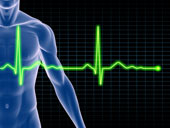Prevention in Healthcare: Shift Work Linked To Higher Risk Of Heart Attack, Stroke

An analysis that reviews
studies covering over two million people finds shift work is associated with a
higher risk for vascular events, such as heart attack and ischemic stroke. The
study is the largest examination of shift work and vascular risk to date.
The researchers, from Canada
and Norway, write about their findings in a paper published online in the BMJ
on Thursday.
They report that compared to
regular daytime workers, shift workers had a 24% higher risk for coronary
events, a 23% higher risk for heart attack, and a 5% higher risk for stroke.
Night shift workers had the
highest risk for coronary events (41%).
However, shift work was not
linked to a higher risk of death (from any cause).
Why Study Shift Work?
Scientists have known for a while that shift work
upsets the body's natural body clock (circadian rhythm) and work-life balance,
and a number of studies have linked it to health problems, such as increased
risk of high blood pressure and high cholesterol.
A link with diabetes is also well-established, for instance, a
Harvard-led study reported that rotating
shift work is linked to higher risk for type 2 diabetes.
And the link with cancer has already made a mark in the politics of occupational health since 38
Danish female night shift workers in 2008 were compensated after their breast
cancer was officially recognized as an
occupational illness.
But, the link between shift work and vascular disease
is controversial. The authors propose one reason could be the varying methods,
populations and definitions of shift work and coronary events that previous
studies have used.
They also suggest previous analyses are now outdated:
they "did not use validated tools for assessing studies, did not capture
all available data, and did not apply quantitative techniques to compute
summary risk estimates," they write.
What they Found
For their study, the international team, led by Daniel
G Hackam, associate professor in the Department of Epidemiology and
Biostatistics at Western University in Canada, pooled and analyzed the results
of 34 studies covering 2,011,935 people and compared shift workers to regular
daytime workers or the general population.
They defined shift working as working patterns that
differed from regular daytime working (9 am to 5 pm), including evening shifts,
irregular or unspecified shifts, mixed schedules, night shifts and rotating
shifts.
Of the more than 2 million participants, 17,357
experienced some kind of coronary event, 6,598 had heart attacks (myocardial
infarction), and 1,854 had ischaemic strokes. An ischaemic stroke is caused by
a lack of blood supply in the brain.
The analysis showed all these vascular events were
significantly more common among shift workers than other people.
The researchers found that:
"Shift work was associated with myocardial
infarction (risk ratio 1.23, 95% confidence interval 1.15 to 1.31; I2=0) and
ischaemic stroke (1.05, 1.01 to 1.09; I2=0). Coronary events were also
increased (risk ratio 1.24, 1.10 to 1.39), albeit with significant
heterogeneity across studies (I2=85%)."
By "significant heterogeneity" the
researchers refer to the fact that there was a certain lack of consistency in
research methods, assumptions, sampling criteria and definitions across the 34
studies they analyzed.
When they examined the possible sources of this lack
of consistency in study methods, they found that "presence or absence of
adjustment for smoking and socioeconomic status" was not one of them.
They also found that although the risk for vascular
events was higher among shift workers, the results show they were at no higher
risk of death from any cause.
Implications
The researchers say that although the relative risks
they calculated are modest, because of the high frequency of shift work in the
general population, the implications for public health are not insignificant.
For instance, if you applied these risks to Canada,
where during 2008-09, nearly a third of workers were on shifts, then 7% of
heart attacks, 7.3% of all coronary events, and 1.6% of ischaemic strokes could
be due to shift working.
The findings should impact public policy and
occupational medicine, say the researchers.
For example, shift workers could be educated about how
to spot early signs of heart problems, and screening programmes could help
identify and treat risk factors like high blood pressure and cholesterol in
shift workers.
The researchers call for further studies to find out which groups of
shift workers are likely to be the most affected by these findings, and how
overall vascular health is affected by changes in shift patterns.
Fuente: Medical News Today
No comments:
Post a Comment